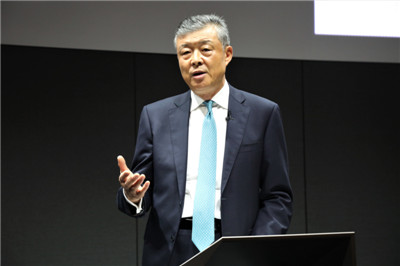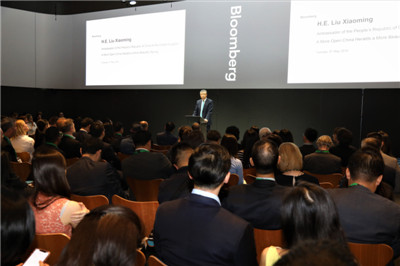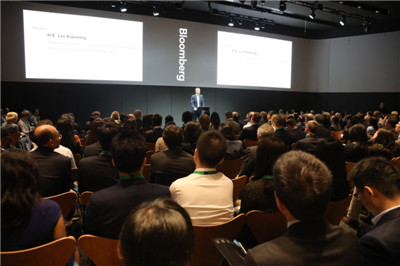|

Mr. Cotzias,
Ladies and Gentlemen:
It is a real delight to join you at Bloomberg’s new European Headquarters to talk about the economic and financial cooperation between China and the UK.
This year marks the 40th anniversary of China’s reform and opening up policy. It is an important year for us to look back to see how far China has come and look ahead to what the future holds for us.
Therefore, I would like to take this opportunity to share with you
-
what China has learned from the reform and opening up,
-
what measures we are going to take to open up wider to the world
-
and what opportunities there are for China-UK economic and financial cooperation.
The great journey of reform and opening up began in 1978. For 40 years since then, the Chinese people have worked tirelessly and relentlessly to extend this policy from rural areas to cities, from pilot zones to the entire country, and from economic restructuring to deeper reforms across the board. With wisdom and diligence, China has created a miracle in the world history of development.
Just as President Xi said, “Reform and opening-up, which is China’s second revolution, has not only profoundly changed the country but also greatly influenced the whole world.”
On the one hand, reform and opening up has led to historic economic and social achievements in China.
The past 40 years saw China changing profoundly, growing in comprehensive national strength and becoming more integrated with the world.
In 1977, China’s GDP was only $175 billion, accounting for 2% of the world’s total and ranking the tenth in the world.
In 2017, China’s GDP was $12 trillion, increasing nearly 68 times, accounting for 15% of the world’s total and making China the second largest economy in the world.
Moreover, China is now the world’s largest industrial country, largest trader in goods and has the largest foreign exchange reserves. It has lifted over 700 million people out of poverty and improved the standard of living. It has established a basic social security system that covers the largest population in the world. Today, the Chinese people have a much higher happiness index and a stronger sense of security and achievements.
On the other hand, China’s reform and opening up has profound influence on the world economy.
For 40 years, China has adhered to the basic policy of opening up. From a closed and semi-closed country to one that opens up on all fronts, from a recipient of FDI to a global investor, from a late comer in the WTO to the proponent of the Belt and Road Initiative, China has been an active participant in and support of economic globalisation. In this process, China has made important contribution to the sustainable development of the world economy.
Even in the years following the global financial crisis of 2008, China maintained a medium-high growth rate and contributed over 30% of world economic growth. In fact, China has become a stabiliser and powerhouse for world economic recovery.
The key to such huge success of the reform and opening up lies in the Chinese people’s ability
-
to proceed from China’s national conditions;
-
to take a global vision;
-
to keep its doors open;
-
to integrate with the world;
-
and to explore and work tirelessly to blaze a path of socialism with Chinese characteristics.
In my opinion, from the success of its reform and opening up, China has learned at least the following three things:
First, to advance reform, one must follow the trend of the times.
When China started reform and opening up, we did not have a guidebook telling us what to do. “Crossing the river by feeling the stones” is how China experimented and pressed ahead with many of its reform programmes.
In recent years, as China shifts from high-speed growth to high-quality growth, our reform has entered the “deep water zone”. Reforms in relation to the state-owned enterprises, the state assets, fiscal and tax system, financial system, social security and eco-conservation – these are not low hanging fruits but hard bones to gnaw at.
In light of this new situation, the Central Leading Group for Deepening Overall Reform was established. It is responsible for the overall planning, coordination, promotion and implementation of reform measures.
Two months ago, this Group was upgraded to form the Central Committee for Deepening Overall Reform. This is intended to enhance top-level design so that decisions and plans of reforms are made in a systematic, holistic and coordinated manner, and our reform efforts are focused on the main problems.
Second, to deepen reform, one must find out what has gone wrong and adopt a problem-led approach.
In the past 40 years, China started with economic restructuring and gradually moved on to the political, cultural, social and ecological areas. In this “five-pronged” reform, China has never sidestepped a problem. Our approach is to start in easier fields and gradually tackle more difficult areas. This approach to reform and opening up is in line with China’s national conditions.
In the recent five years, in particular, China adopted over 1,500 reform measures and displayed great determination and courage in tackling the difficult issues. This has led to breakthroughs in major areas and key links.
The result is encouraging. The main framework for reform in major areas has been set up. Reform is in full swing, deepening on all fronts and achieving many breakthroughs.

Third, to gauge the success of reform, one must take the people’s interests as the criterion.
The people have always been at the centre of all reforms in China. This was true with the household contract system at the beginning of China’s reform and opening up. This remains true as China deepens reform across the board today. The intension and the goal of China’s reform have always been to ensure that the people live happier, safer and have a stronger sense of achievements.
Recent reform measures all answer to the aspiration of the people that involves their interests directly. To name a few, these include targeted poverty alleviation, urbanisation of the population, environmental improvements, streamlining of administration, delegation of powers, and property rights protection.
Take targeted poverty reduction for example. In the past five years, more than 60 million people have been lifted out of poverty, and the poverty headcount ratio has dropped from 10.2% to less than 4%. China has not only set clear goals for poverty reduction but also established a complete system of contribution from both the central and local government departments. This fully reflects that China puts the people’s interests first in its reform.
Confucius said, “At forty, I had no doubts.”
As China celebrates the 40th anniversary of its reform and opening up, there is no doubt that without reform and opening up, China would not have come so far. Nor would it have a bright future. Going forward, China will still need to rely on reform and opening up to achieve high-quality growth.
Forty years ago, China opened its door and embraced the world. Forty years on, China is opening its door wider in the new era.
-
This shows China’s confidence and sense of responsibility.
-
As China “grows richer” and “becomes stronger”, opening-up is a natural choice.
-
As China catches up with and begins to lead the trend of the times, opening up is a show of courage that China is ready to shoulder important global responsibilities.
At the 19th National Congress of the Communist Party of China, it was clearly announced that China adheres to the fundamental national policy of opening up. China pursues development with its doors wide open .
“China’s door of opening-up will not be closed and will only open even wider.”
At last month’s Annual Conference 2018 of the Boao Forum for Asia, President Xi Jinping announced important measures for further opening up. They can be summarised as three “More’s”:
First, a more open market.
China will greatly increase market access in financial and manufacturing sectors.
In the financial sector,
-
China will implement the important measures announced at the end of last year, namely, to raise the limit on foreign ownership in joint-venture firms involved in the banking, securities and insurance market;
-
China will accelerate the pace of opening up in the insurance sector;
-
China will ease the limit on the establishment of foreign-invested financial institutions, expand the scope for their operations in China and open more areas to financial cooperation between Chinese and foreign firms.
In the manufacturing sector, China will
-
implement measures to open up the automobile, ship building and aircraft industries,
-
and raise the limit on foreign ownership in join-venture firms, especially in the automobile industry.
The second “More” is a more favourable environment for investment.
This means China will enhance alignment with international rules, increase transparency, strengthen IP protection and rule of law, encourage competition and oppose monopoly.
Moreover, China will issue a new negative list for foreign investment at an early date, and complete the implementation of pre-establishment national treatment plus a negative list.
In IP protection, China will build on the efforts of the newly-restructured State Intellectual Property Office to step up law enforcement and strengthen legal measures against IPR infringement.
The third “More” is more import facilitation.
China will take the initiative to expand imports. This will lead to further cut of tariffs on automobile and other products, and acceleration of the procedures of joining the WTO Government Procurement Agreement.
Such measure would certainly be more effective if developed countries would reduce or remove the restrictions on normal and reasonable trade in high-tech products and relax the control on the export of such goods to China.
This November, the first China International Import Expo will be held in Shanghai. This is not just another exposition in an ordinary sense. It is a major testament to China’s commitment to further opening up its market. It is a good opportunity for companies from all over the world, including from the UK, to introduce their products and services to the Chinese market.
Ladies and gentlemen,
In the past 40 years since China adopted the reform and opening-up policy, China-UK relations have made strong headways.
President Xi’s successful state visit to the UK in 2015 ushered in the China-UK “Golden Era”. Since then, China-UK relations have made steady progress and achieved fruitful results.
In 2017, bilateral trade between China and the UK stood at $79 billion, up by 6.2% over the previous year. China is already the UK’s second largest trading partner outside the EU, and the UK is China’s second largest trading partner in the EU.
As of the end of 2017, British investment in China reached $22.55 billion. In the opposite direction, non-financial direct investment from China to the UK totaled $19.14 billion. This has made the UK the second largest source and destination of investment for China within the EU.
Going forward, how shall we seize the new opportunities arising from China’s further opening-up in the new era and accelerate the development of the China-UK “Golden Era”?
I would like to share with you my three suggestions.

First, China and the UK should stay committed to openness and uphold the international trade system.
Both China and the UK have supported globalisation, engaged in free trade and upheld the multilateral trade regime. History tells us that globalisation is irreversible and protectionism is unpopular.
In the current circumstances, China and the UK have a stronger consensus on upholding globalisation, opposing protectionism and reforming the global economic governance system. It is all the more important that our two countries shoulder our due responsibilities as major countries.
We must hold high the banner of openness, stay firmly opposed to protectionism of all forms, promote trade and investment liberalisation and facilitation, and uphold the multi-lateral trade regime. We should commit ourselves to building an open world economy.
Second, China and the UK should work together to promote steady and sustained development of the China-UK “Golden Era”.
China has always approached and developed China-UK relations from a strategic and long-term perspective. China hopes to deepen cooperation with the UK in the political, economic, cultural areas and in global governance, in order to achieve common development.
At the beginning of this year, Prime Minister May paid a successful visit to China. During the visit, the leaders of our two countries agreed to build a more strategic, practical, global and inclusive China-UK “Golden Era”; The two sides signed business contracts worth £9 billion.
In the future, China and the UK can further match the development strategies and deepen cooperation both at the bilateral and international level. Together we can set an example of win-win cooperation and common development between China and Western countries.
My third suggestion is to tap the potential in the economic and financial sectors and create more highlights in China-UK cooperation.
There is a strong complementarity between China and the UK in economy and trade. Therefore, China’s further opening-up will create more opportunities for our two countries to build closer partnership in economy, trade, infrastructure development, equipment manufacturing and FinTech.
Last month, China announced further opening-up measures in the financial sector, which were summarised as “6+5+1”.
Six measures will be implemented in the next few months. These include:
1. Remove the foreign ownership cap for banks and asset management companies, treating domestic and foreign capital equally; allow foreign banks to set up branches and subsidiaries at the same time,
2. Lift the foreign ownership cap to 51% for securities companies, fund managers, futures companies, and life insurers, and remove the cap in three years,
3. No longer require joint-funded securities companies to have at least one local securities company as a shareholder,
4. To further improve the stock market connectivity of the Chinese mainland and Hong Kong, we will increase the daily quota by three times from May 1, after which the daily quota for Shanghai-bound and Shenzhen-bound investment will be increased from RMB 13 billion to RMB 52 billion, while that for Hong Kong-bound investment from RMB 10.5 billion to RMB 42 billion,
5. Allow eligible foreign investors to provide insurance agent and loss adjuster services in China, and
6. Lift restrictions on the business scope of foreign-invested insurance brokerage companies, treating them as equals of domestic companies.
In addition, we will roll out five more opening up measures before the end of this year:
1. Encourage foreign ownership in trust, financial leasing, auto finance, currency brokerage and consumer finance,
2. Apply no cap to foreign ownership in financial asset investment companies and wealth management companies newly established by commercial banks,
3. Substantially expand the business scope of foreign banks,
4. Remove restrictions on the business scope of jointly-funded securities companies, treating domestic and foreign institutions equally, and
5. Foreign insurance companies will no longer need to have a representative office in China for two consecutive years prior to establishing a fully-owned institution.
“One” refers to the Shanghai-London Stock Connect which planned to be launched by the end of this year.
All these new measures will create huge business opportunities for China and the UK to enhance cooperation in the financial sector. To grab these opportunities, British companies can make full use of their expertise in financing, public-private-partnership, insurance and green finance, and set up businesses in China. This will deliver win-win results for both sides.
Ladies and gentlemen,
There is a saying in China. “A single flower does not make a spring. The beauty of spring lies in different flowers blossoming together. ”
Likewise, the beauty of our world lies in different countries prospering together. Only with open and win-win cooperation can we build a peaceful, tranquil, prosperous and beautiful world.
I hope that the business and financial leaders like you will follow the trend of the times, uphold the principles of open and inclusive cooperation and seize the opportunities offered by China in the new era.
Together we will embrace a more beautiful spring for the China-UK “Golden Era”!
Thank you!
Now I would like to take your questions.
* * *
On May 8, Ambassador Liu delivered the above keynote speech at Bloomberg’s European Headquarters. About 200 people attended the event, including Constantin Cotzias, Director of Bloomberg Europe, David Merritt, Director of Bloomberg European News, Sun Yu, Chairman of China Chamber of Commerce in the UK, and representatives from Chinese and British financial, business, and media sectors. After the speech, Ambassador Liu answered questions on China-UK cooperation on trade and investment, opening up of China’s financial sector, British SMEs’ investment and business in China, and the situation on the Korean Peninsula.

|

